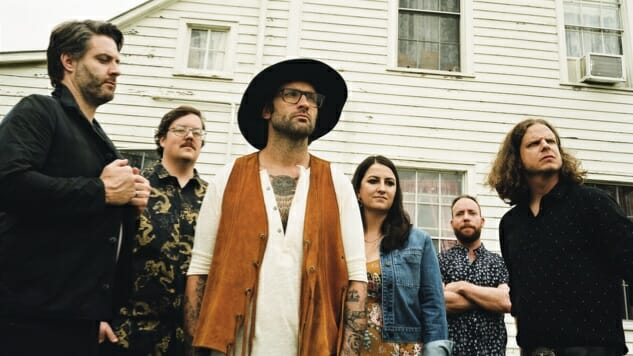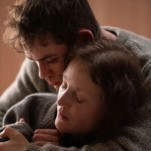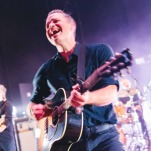The Strumbellas: Songs of Hope in a Dark Time
Photo by Pooneh Ghana
In this time of division and rancor, songs of community and hope are needed more than ever. But such songs are useful only if they can persuade us to trust their message. And that’s one of the hardest tricks to pull off in pop music. In fact, any hint of sappy sentiment or formulaic bromides is likely to create mistrust and produce more pessimism than optimism.
That’s why the Strumbellas are the right band at the right time. The Ontario sextet’s new album Rattlesnake boasts the kind of anthemic choruses that can rouse an audience from its seats to dance in place and sing along. The stimulus is not so much the positive lyrics—which are easy to write—but rather the magnetic melodies, which are so difficult to come up with.
It’s not the words (“Hang on, kid, you’re my salvation”) that puts across the chorus from the album’s first single, “Salvation,” for example; it’s the irresistible vocal line (three descending half notes, a brisk, ascending triplet and a payoff on a rising note). That knack for melodic hooks is the most elusive talent in popular music, but lead singer/chief songwriter Simon Ward has it.
It’s a dangerous gift, however, for it can all too easily lead to gooey treacle. Fortunately, Ward is aware of the danger and counterbalances his all-together-now choruses with darker, singer-songwriter verses. That balance grows out of his two major enthusiasms in music.
“My favorite genre is alternative-folk—slow, sad, personal songs,” Ward, 36, explains, “but my second favorite genre is pop music, I love how big it is, how hard it hits, how good it makes you feel. Sometimes I write melodies that are folkie and confessional, and sometimes I write melodies that are big and communitarian. Then we mash them together. Sometimes it happens that they come together. I’ll write a slow song and in the middle I’ll say, ‘I love pop music so much; let’s write a big pop chorus.’”
Just before the big chorus arrives on “Salvation,” for example, the band drops away, leaving Ward’s acoustic guitar and his whispery voice to murmur, “Will they love me now?” Having voiced his self-doubt, Ward invites the band back on board and over the thumping drums and chiming synths tells himself, “Just put it all out, don’t let your head down.” The song wouldn’t work as well as it does if the hope hadn’t been countered by the doubt—and vice versa.
“Between you and me, that’s who I am,” Ward says. “It’s remarkable how I can wake up one day and be a very positive human being and write upbeat lyrics. Then I can wake up the next day and feel miserable and write a song to match. That’s our band: we’re up and down, happy and sad. I hate that; I wish I wasn’t like that, but we try to ride that wave. Every third day, I call up my manager and say, ‘I’m out of creative juices; there’s nothing left; break up the band and cancel the tour.’ Then the next week, I’ll write a cool song and say, ‘Fire up the tour bus; I’m ready to go.’ If I don’t write anything good in a week, I get angry at myself.”
Watch The Strumbellas perform live at the Paste Studio:
The new song “We All Need” begins with an unhurried acoustic-guitar strum and Ward’s conversational voice lamenting that he’s “spent many years, many years in the darkness. Oh, I’m tired of trying, I did my best.” But the band soon comes to the rescue, stiffening the rhythm and shaping the melody to a more confident statement: “We all need someone to love and to hold.” And those someones appears in the form of backing singers cooing
Ooooh,” in stacked, four-part harmony.
“When I talk to the producers, I say, ‘I want to make pop music. Can you make it sound like Imagine Dragons?’” Ward says. “And it’s not because I want to be famous; it’s because I want that feel. I don’t know how those producers do it, that fantastic big sound, but I love it. Tim Pagnotta, the producer on this album, told me, ‘Keep in mind: you’re a folk singer with a folk band.’ I said, ‘Yeah, sure, but I want that Miley Cyrus kick drum sound.’ So we go back and forth and it’s a compromise.”
-

-

-

-

-

-

-

-

-

-

-

-

-

-

-

-

-

-

-

-

-

-

-

-

-

-

-

-

-

-

-

-

-

-

-

-

-

-

-

-








































